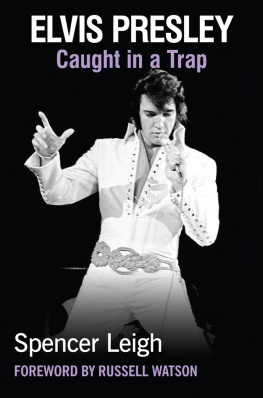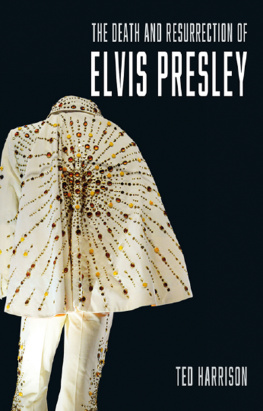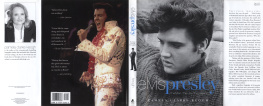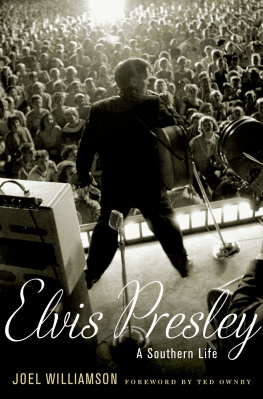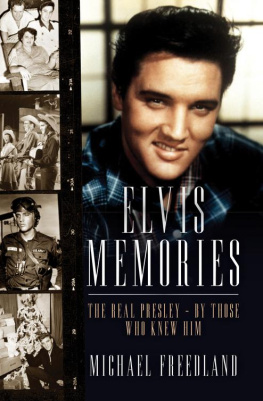
Roaring Forties Press
1053 Santa Fe Avenue
Berkeley, California, 94706
All rights reserved. First published in 2012.
Copyright Mark P. Bernardo.
Printed in the United States of America.
Library of Congress Cataloging-in-Publication Data
Library of Congress Cataloging-in-Publication Data
Bernardo, Mark P., 1969
Elvis Presley : Memphis / Mark P. Bernardo.
p. cm. -- (MusicPlace series)
Includes bibliographical references.
ISBN 978-0-9846239-0-7 (pbk. : alk. paper) -- ISBN 978-1-938901-00-3 (epub) ISBN 978-1-938901-01-0 (kindle) -- ISBN 978-1-938901-02-7 (pdf) 1. Presley, Elvis, 1935-1977--Homes and haunts--Tennessee--Memphis. I. Title.
ML420.P96B53 2012
782.42166092--dc23
[B]
2011037027
contents
acknowledgments
T his book could not have been possible without the work of numerous other writers and researchers that preceded it, primarily Peter Guralnicks definitive two-volume biography of Elvis, Last Train to Memphis and Careless Love. Other Elvis biographers and confidants whose work was helpful include Alanna Nash, Billy Smith, Marty Lacker, Lamar Fike, Priscilla Presley, Peter Harry Brown, Pat H. Broeske, and Robert Gordon. Frommers Nashville and Memphis was both a great source of Memphis information and an invaluable tool in planning my research trips to the city. Many newspaper and magazine articles, both historic and recent, also provided useful material.
Scotty Moores website (www.scottymoore.com) was an incredible resource for tracking down information on many of the sites listed in the book, particularly the ones that have since disappeared. Other notable Web sources included the Elvis Information Network (www.elvisinfonet.com) and the Australian Elvis fan site (www.elvispresley.com.au), a treasure trove of meticulously researched Elvis history. Valuable information on the Loews State Theatre and other movie theaters came from www.cinematreasures.com.
Special recognition is due to Hal Lansky of Lansky Brothers Clothiers, who kindly took time out of a busy day at the Lansky Brothers store to show me around and answer questions about his family and Elvis Presley; Kelly Earnest, public relations director at the Peabody Hotel, who made sure our stay in Memphis was both comfortable and informative; Jason Sensat, the current Peabody Duckmaster, who provided historical tidbits and insights into the hotel; Jayne White, publicity director at Sun Studio; Bill Patton of Backbeat Tours (and author of A Guide to Historic Downtown Memphis), a font of knowledge about Memphis history who filled in information gaps about numerous sites in this book and contributed a few more that werent originally on my list; Jackie Reed, communications manager for the Memphis Convention and Visitors Bureau; Memphis Jones, the singing raconteur who led our tour around the city; my publishers, Deirdre Greene and Nigel Quinney at Roaring Forties Press, for their enthusiastic support of this project and dedication to making it the best it could be; and my wife, partner, research assistant, and fellow Elvis fan, Holly, for her unfailing encouragement.
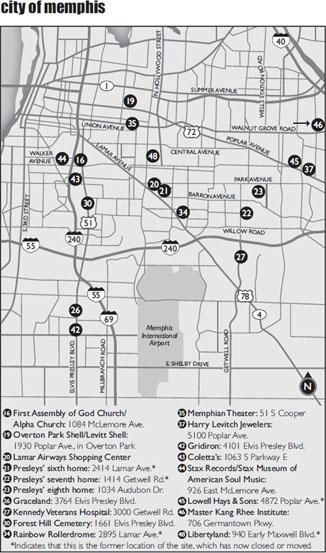
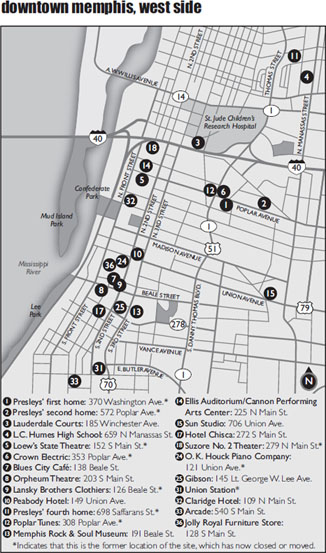
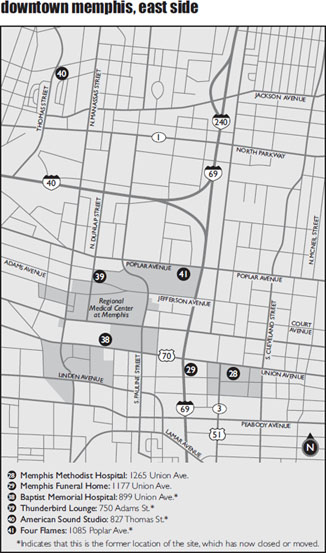


Main Street, Memphis, 1950s.
Chapter 1
building the bluff city
What did I miss about Memphis? Everything.
Elvis Presley, 1960, after his discharge from the U.S. Army
Y ou can tell a lot about a city just by visiting its airport. Las Vegass McCarran International Airport is full of slot machines and has huge murals of nightclub acts. Miami International Airport greets its visitors with faux palm trees and sunny pastels. When you disembark at Memphis International Airport, the symbols of the citys identity await you near the baggage claim carousels, in a kiosk featuring three vintage musical instruments mounted in front of large photos of their owners: blues legend B. B. King, soul icon Isaac Hayes, and Elvis Presley, both the King of Rock n Roll and, arguably, the originator of it.
Rock n roll means something much different today than it did when Elvis was a teen. The modern term conjures images of raucous arenas, enormous drum sets, and massive amplifiers. Rock stars today are often regarded as pampered, overindulged celebrities, surrounded by bodyguards, staying in opulent hotel rooms with easy access to drugs, booze, and wall-to-wall groupies. Several of these stereotypes started with Elvis during his self-destructive later years.
How ironic, then, that rock n roll began in a modest, two-story brick recording studio, in a mid-South city that made its musical reputation on Delta blues and hillbilly music. And that the young man who became its symbol was a poor, shy kid from rural Mississippi whose primary musical love was gospel and whose first albums didnt even have a drummer.
Memphis, Tennessee, was instrumental in bringing blues, gospel, soul, rockabilly, and, yes, rock n roll, to mainstream popularity in America. All these musical genres are woven into the citys historical tapestry and remain essential elements of its identity today, but only rock n roll can trace its origins to the city itself. Elvis Presley and his legendary career are the common thread that runs through all these musical styles. The day that a twenty-year-old truck driver for Crown Electric came in to Sam Phillipss Sun Records recording studio to (legend has it) make a record for his beloved mama was the beginning of a musical movement that would dominate popular music, and society at large, for generations, and would take Elvis Presley on a meteoric journey from local hero to worldwide phenomenon. And yet, while rock n roll itself outgrew the city of its birth, Elvis never fully uprooted himself from his adopted hometown. For Elvis Presley, the first rock star, whether he was making movies in Hollywood or playing sold-out shows in Vegas, Memphis was home; from his youngest days, the music of his hometown was his inspiration.
Yet, to focus only on the music while ignoring the events that inspired it would be to paint an incomplete picture of Memphiss musical heritage. Nothing exists in a vacuum, and no musical tradition emerges out of thin air. To understand the music of Memphis, and the profound role that it played in both the history of the city and the shaping of its most famous musical icon, one must understand the turbulence and struggles from which that music arose.
overtons dream
The wooded bluffs overlooking the Mississippi River had long been the home of several Native American tribes, primarily the Chickasaw, even before it was said to be the site of Spanish explorer Hernando de Sotos discovery of the Mississippi in 1541. The land on which Memphis stands once contained a French fort, Fort Assumption, and a Spanish fort, San Fernando de los Barrancas. The Tennessee territory, of which Memphis was the westernmost sector, was part of North Carolina in 1783, when that states government, despite the Chickasaws claims to it, opened the area to settlement. (Tennessee became a state and was admitted into the Union in 1796.) In a prelude to the racial struggles that would plague Memphis in the nineteenth and twentieth centuries, European settlers and Native Americans clashed over ownership of the land for several decades.
Next page


